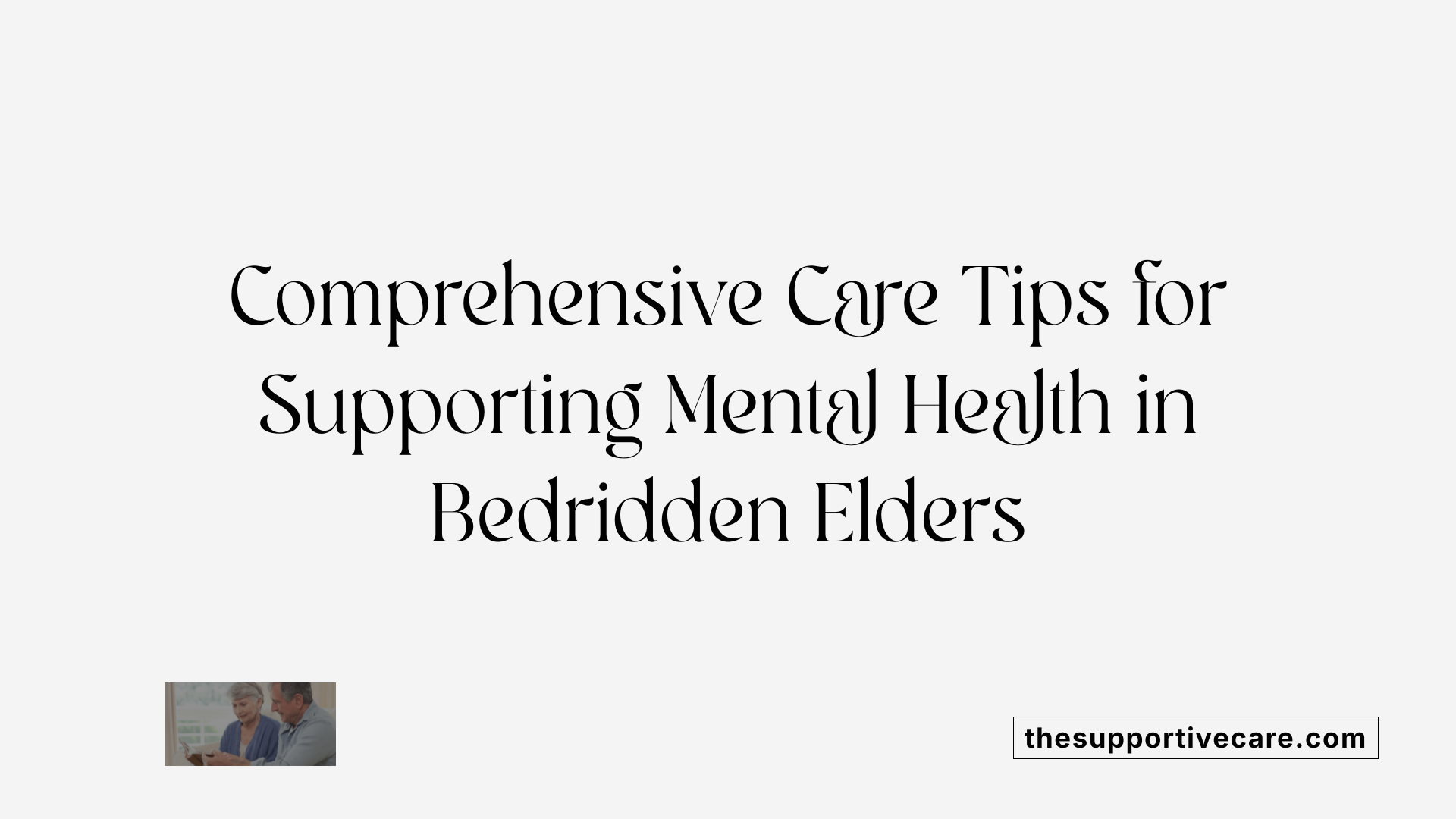Understanding the Silent Crisis
As the global population ages, an increasing number of seniors find themselves confined to bed due to chronic illnesses, injuries, or neurological conditions. While physical health challenges are evident, the profound impact on mental health often remains overlooked. Bedridden elderly individuals face unique psychological hurdles that can significantly diminish their quality of life. This article explores the various dimensions of mental health challenges faced by bedridden seniors, the contributing factors, early signs, and effective strategies for prevention and intervention.
Recognizing Mental Health Symptoms in Bedridden Seniors

What are the symptoms and signs of mental health issues in bedridden elderly individuals?
Mental health challenges among bedridden seniors often manifest through a combination of emotional, behavioral, cognitive, and physical symptoms. Identifying these signs early is crucial for timely intervention and improving quality of life.
Among the emotional and behavioral signs, persistent feelings of sadness, hopelessness, and emptiness are common. Seniors may withdraw socially, lose interest in activities they once enjoyed, or neglect personal hygiene routines. Irritability, agitation, and sometimes risky or compulsive behaviors may also emerge. These behaviors can be mistaken for normal aging or physical illness but are important indicators of underlying mental health issues.
Cognitive symptoms are another vital area to observe. Seniors might frequently experience confusion, forgetfulness, or disorientation. Hallucinations and delusions can occur, especially in cases of dementia or delirium. Difficulty in completing simple tasks or following conversations may be signs of cognitive decline needing urgent attention.
Physical symptoms often accompany mental health problems and can include sleep disturbances like insomnia or hypersomnia, changes in appetite—either increased or decreased—and chronic fatigue. Gastrointestinal issues, such as unexplained nausea or constipation, may also be linked to emotional distress.
Caregivers should be vigilant for these signs, particularly since physical and mental health conditions can sometimes mask each other. Regular monitoring and professional assessments are vital to differentiate mental health disorders from other medical issues.
Recognizing early symptoms helps in implementing appropriate treatment strategies, including counseling, medication, and social activities, which can significantly improve the overall well-being of bedridden elderly individuals.
How do behavioral, cognitive, and physical signs overlap?
The symptoms of mental health issues in bedridden seniors are often interconnected. Emotional distress can lead to behavioral changes like social withdrawal, which further worsens feelings of loneliness and depression.
Cognitive symptoms such as confusion and hallucinations may be exacerbated by physical issues like poor sleep or nutritional deficiencies, creating a complex clinical picture.
Understanding these overlapping signs can help caregivers and healthcare professionals approach diagnosis and care holistically, ensuring that mental health concerns are addressed alongside physical health needs.
| Symptom Type | Common Signs | Additional Details |
|---|---|---|
| Emotional | Sadness, hopelessness, emptiness | Lasts more than two weeks, affects daily function |
| Behavioral | Social withdrawal, neglect of hygiene | Can include agitation or irritability |
| Cognitive | Confusion, forgetfulness, hallucinations | Common in dementia, delirium |
| Physical | Disrupted sleep, appetite changes, fatigue | May be mistaken for aging-related issues |
How to differentiate signs of depression, anxiety, and cognitive decline?
Each mental health condition presents with specific patterns. Depression often shows as prolonged sadness, loss of interest, changes in sleep and appetite, and fatigue. Anxiety features excessive worry, restlessness, and physical symptoms like muscle tension and nausea. Cognitive decline involves declining memory, disorientation, and hallucinations.
However, overlap exists; for example, depression may include confusion, or anxiety may be accompanied by sleep disturbances. Proper assessment by healthcare professions can help distinguish between these conditions, guiding targeted treatment.
Recognizing these signs enables caregivers and clinicians to implement appropriate mental health support, such as therapy, medication, or social engagement, ultimately enhancing the senior's quality of life.
The Intersection of Physical Immobilization and Mental Health

What are common mental health challenges faced by bedridden seniors, and what factors contribute to these issues?
Bedridden elderly patients frequently encounter significant mental health struggles such as depression, anxiety, and cognitive decline. Immobilization deeply affects their psychological state, often leading to feelings of helplessness, worthlessness, and despair. These emotional responses are compounded by physical limitations that hinder social interaction and engagement in stimulating activities.
Social isolation is a major contributor to these mental health issues. When seniors are confined to bed, their opportunities for social contact diminish drastically, fostering loneliness and boredom. The absence of regular interaction with loved ones or community members leaves them vulnerable to negative emotional states.
Chronic illnesses associated with aging, like stroke, diabetes, and heart disease, also play a role by increasing dependency and diminishing a sense of autonomy. Such health issues not only cause physical pain but also impair mental well-being by reinforcing feelings of being a burden.
Environmental factors, including environments that lack accessibility, stimulating activities, or technological aids, can further worsen mental health. Without access to communication tools or entertainment, seniors may experience increased frustration and mental fatigue.
Emerging interventions, such as telemedicine services, online social networks, and assistive communication devices, are becoming vital in providing mental stimulation and opportunities for social engagement to bedridden seniors. These tools help bridge the gap caused by immobility, enabling seniors to stay connected with their social circles and healthcare providers.
Research supports a multidisciplinary approach to address these issues effectively. Such strategies encompass psychological support, social interventions, physical activity adaptations, and the integration of modern technology. Together, these measures can significantly reduce feelings of depression, anxiety, and cognitive deterioration in immobilized elderly individuals, promoting better overall mental health and quality of life.
Prevention and Management of Mental Health Issues in Bedridden Seniors

How can social connections and routines help in preventing mental health problems?
Maintaining social contact and establishing a routine are vital strategies in supporting the mental health of bedridden seniors. Regular visits from family, friends, or caregivers create opportunities for social interaction that combat feelings of loneliness and social isolation.
A consistent daily routine that includes specific times for meals, activities, rest, and social engagement provides stability and a sense of normalcy. This predictability can reduce anxiety, improve sleep patterns, and foster a feeling of safety. Simple routines such as morning hygiene, scheduled interaction times, or regular light activity help instill purpose and normalcy.
These practices not only improve mood but also promote cognitive function, helping seniors feel more engaged and less disconnected from their surroundings.
What mental activities and cognitive stimulation benefit bedridden elders?
Engaging in mental activities offers essential cognitive stimulation that helps maintain memory and thinking skills. Activities like reading books, listening to music, watching movies, or listening to podcasts provide entertainment and mental engagement.
Creative pursuits such as crafting, drawing, writing, or journaling serve as therapeutic outlets, nurturing self-expression and purpose.
Participating in online courses or webinars can also enhance mental alertness and provide a sense of achievement. Puzzles, crosswords, and memory games are excellent for keeping the brain active.
Encouraging daily mental exercises prevents cognitive decline and fosters a positive emotional state, critical for overall well-being.
How do relaxation techniques support mental health?
Relaxation exercises such as mindfulness, deep breathing, and meditation are powerful tools to manage stress, reduce anxiety, and promote emotional stability in bedridden seniors.
Mindfulness involves paying attention to the present moment calmly and non-judgmentally, which can help reduce feelings of frustration and helplessness.
Deep breathing exercises activate the body’s relaxation response, easing tension and lowering anxiety levels.
Meditation can help seniors find mental clarity, decrease depressive symptoms, and improve sleep quality.
Incorporating these techniques into daily routines can significantly improve mood and promote resilience against mental health challenges.
What role do mental health professionals and caregivers play?
Early involvement of healthcare and mental health professionals is crucial for identifying and treating emerging mental health issues. Routine screenings for depression, anxiety, or cognitive decline can facilitate timely interventions.
Mental health professionals can provide psychotherapy, medication management, and cognitive-behavioral therapy tailored to individual needs.
Caregivers support mental health by fostering a supportive environment, encouraging activities, and observing changes in mood or behavior.
Training caregivers in basic psychological support and stress management techniques enhances their capacity to assist effectively. Support groups and respite care services offer additional relief, preventing burnout among caregivers.
Overall, a collaborative approach involving professionals and caregivers ensures comprehensive mental health management, improving the quality of life for bedridden elders.
Interventions and Resources for Addressing Mental Health Difficulties
What interventions and resources are available to address mental health difficulties in immobilized elderly individuals?
Caring for bedridden seniors involves a multifaceted approach that emphasizes mental health support. Psychological counseling, support groups, and psychosocial therapies play significant roles in providing emotional outlets. These interventions help reduce feelings of loneliness, depression, and anxiety by fostering social interaction and emotional expression.
Innovative technologies, such as virtual reality (VR), are increasingly used as tools for cognitive engagement. VR experiences can immerse patients in stimulating environments, encouraging mental activity, enhancing motivation, and alleviating fears related to physical health decline or mobility issues.
Physical activity, carefully adapted to the individual's capacity, is essential. Gentle exercises, passive and active movements, and early mobilization techniques can boost mood, improve physical strength, and minimize complications like muscle cramps or depression caused by social isolation.
Effective pain management and patient education are critical components. Proper education about their condition and treatment options can empower seniors, reduce anxiety, and improve compliance with therapies.
Therapies like cognitive-behavioral therapy (CBT), reminiscence therapy, and mindfulness exercises are evidence-based strategies to address anxiety and depressive symptoms during extended bedrest.
A comprehensive intervention plan often involves a collaborative effort among healthcare providers, mental health specialists, caregivers, and community resources. This team-based approach ensures that care is accessible, patient-centered, and culturally sensitive, ultimately aiming to preserve mental well-being and enhance quality of life.
| Intervention Type | Description | Additional Details |
|---|---|---|
| Counseling & Support Groups | Offer emotional support and social interaction | Can be delivered in person, by phone, or online |
| Technology Use | Virtual reality & cognitive stimulation tools | Stimulate cognition, reduce anxiety, promote motivation |
| Physical & Mobilization | Guided exercises, passive movements, early mobilization | Improve mood, maintain muscle strength, prevent complications |
| Pain Management & Education | Use of medication and informational support | Reduce discomfort, empower through knowledge |
| Psychotherapies | CBT, reminiscence therapy, mindfulness | Alleviate anxiety, depression, and emotional distress |
Monitoring mental health signs like sadness, anger, or loss of energy is essential. Early recognition allows timely intervention, which can significantly improve outcomes for immobilized elderly patients.
Impact of Bedrest on Elderly Psychological Well-being and Quality of Life
How does being bedridden impact the psychological well-being of seniors?
Being bedridden can significantly diminish the psychological health of elderly individuals. Many experience intense feelings of helplessness and loss of control, as their mobility and independence are severely restricted. This situation often leads to social isolation because opportunities to interact with family, friends, and the broader community are greatly reduced.
The inability to perform daily routines or engage in hobbies can foster a deep sense of boredom and frustration. Over time, these emotional states can evolve into depression, which is common among bedridden seniors. Furthermore, the physical decline associated with prolonged immobility, such as muscle atrophy and frailty, can erode self-esteem and amplify dependency on caregivers.
Cognitive health can also be compromised. Due to decreased mental stimulation and limited social interaction, seniors are at a higher risk of experiencing cognitive decline or deterioration in memory, reasoning, and judgment skills. This decline may further impact their mood and ability to communicate.
Despite these challenges, research indicates that mental health can be supported and even improved through specific interventions. Cognitive training programs tailored for the elderly, especially computerized exercises designed to stimulate various cognitive functions, have shown promise. Moreover, implementing light and adaptable physical activities can help maintain muscle strength and boost mood.
In summary, the psychological effects of bedrest on seniors encompass emotional distress, social withdrawal, and cognitive decline, triggered by both physical limitations and environmental factors. Addressing these issues with targeted mental and physical activities can help preserve their dignity, independence, and overall quality of life.
Physical decline leading to reduced self-esteem and dependency
Prolonged bedrest accelerates physical deterioration, including muscle weakness, joint stiffness, and decreased cardiovascular fitness. These changes can reduce a senior’s ability to perform activities of daily living independently, fostering feelings of inadequacy and lowering self-esteem.
Dependence on caregivers increases as seniors become unable to move or care for themselves, which can deepen their sense of loss and helplessness. The stigma associated with dependency and physical frailty may also lead to emotional distress and social withdrawal.
Risks of cognitive decline due to social and physical inactivity
Immobility limits engagement in stimulating activities and reduces social interactions, both of which are protective factors against cognitive decline. Without regular mental challenges and social support, seniors may experience faster deterioration in memory and reasoning skills, increasing the risk of developing conditions such as dementia.
Potential positive interventions: cognitive training, tailored exercises
To counteract these adverse effects, healthcare providers advocate for early and ongoing interventions. Cognitive training, especially through technology-based programs, can improve mental engagement and delay decline.
Physical exercises adapted to the individual’s capabilities, such as passive movements, stretching, and deep breathing exercises, can help sustain muscle strength and circulation. These activities not only benefit physical health but also have positive psychological impacts, including mood enhancement and feelings of achievement.
Integrating these approaches into care plans is essential for maintaining the overall health and happiness of bedridden seniors, allowing them to retain as much independence and mental acuity as possible. Ensuring a holistic approach that addresses both physical and emotional needs can ultimately improve quality of life and provide a more dignified environment for the elderly.
Care Considerations and Support Approaches for Mental Health in Bedridden Seniors

What are the considerations for providing care and support for the mental health of bedridden seniors?
Providing effective and compassionate care for bedridden seniors involves a comprehensive, holistic approach that addresses emotional, psychological, and physical needs. Recognizing that prolonged immobility can lead to feelings of isolation, depression, and frustration, caregivers must remain vigilant for signs such as sadness, anger, emptiness, loss of interest, or changes in appetite and energy levels.
A fundamental aspect of care is maintaining social connections. Facilitating regular visits from loved ones, enabling phone or video calls, and promoting virtual social interactions help reduce feelings of loneliness. Creating an environment that is both stimulating and comforting is vital. Brightening the room with natural sunlight, playing music, or engaging the patient in simple mental activities like puzzles or storytelling can promote cognitive engagement and uplift mood.
Physical health management is equally important to prevent additional distress. Regular repositioning to prevent pressure sores, ensuring proper hygiene, and addressing nutritional needs reduce physical discomfort that can adversely affect mental well-being. Supporting caregivers with resources such as respite care and training helps prevent burnout, ensuring they can provide consistent, empathetic support.
Encouraging involvement in meaningful activities, encouraging personal autonomy where possible, and fostering a sense of purpose or achievement can bolster the patient's resilience. Overall, integrating emotional, environmental, and physical care strategies creates a supportive setting that nurtures mental health and enhances quality of life.
Towards a Holistic Approach to Elderly Mental Well-being
The psychological health of bedridden seniors is an integral aspect of their overall care and quality of life. Addressing issues like depression, anxiety, and cognitive decline requires awareness, early detection, and a compassionate, multidisciplinary approach. Through supportive social engagement, tailored mental activities, technology-assisted interventions, and vigilant physical and mental health management, caregivers and health professionals can significantly improve outcomes. Creating a safe, stimulating environment and fostering dignity and independence—within the constraints of immobilization—are paramount. As aging populations grow, prioritizing mental health in bedridden elderly care will increasingly become a societal responsibility, ensuring that the twilight years of life are marked by dignity, comfort, and psychological resilience.
References
- Mental Health Management Tips for Bedridden Elderly Patients
- Mental health of older adults - World Health Organization (WHO)
- Caregiver Burnout: What It Is, Symptoms & Prevention
- Physical and Mental Health Effects of Family Caregiving - PMC
- The Mental and Physical Effects of a Hospital Stay on Seniors
- [PDF] Bedridden Elderly: Factors and Risks - ResearchGate
- Geriatric Mental Health Issues: Understanding the Challenges in ...
- Mental Health in Nursing Homes | Learn Why it is Important
- Hospice Care and Mental Health: Addressing Psychological Needs



































































































